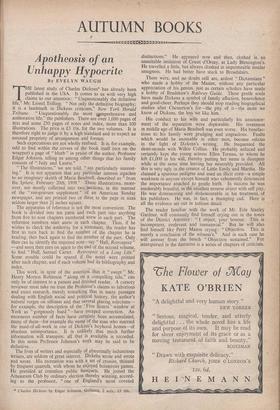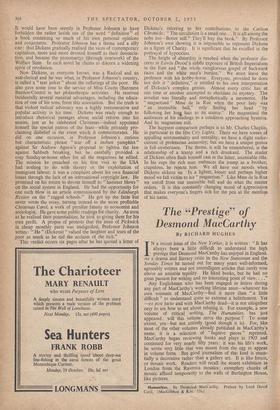AUTUMN BOOKS
-.ft. -.No •••
Apotheosis of an Unhappy Hypocrite
By EVELYN WAUGH THE latest study of Charles Dickens* has already been published in the USA. It comes to us with very high claims to our attention : " Unquestionably the definitive life," Mr. Lionel Trilling. " Not only the definitive biography; it is a landmark in Dickens criticism," New York Herald Tribune. " Unquestionably the most Atomprehensive and authorative life," the publishers. There are over 1,000 pages of text and some 250 pages of notes and index, more than 100 illustrations. The price is £3 10s. for the two volumes. It is therefore right to judge it by a high standard and to expect an unusual propriety of arrangement and format.
Such expectations are not wholly realised. It is, for example, odd to find within the covers of the book itself (not on the wrapper) a page of " blurb " in praise of the author, Professor Edgar Johnson, telling us among other things that his family consists of " Judy and Laurie."
" The illustrations," we are told, " are particularly interest- ing." It is not apparent that any particular interest attaches to an imaginary sketch of Maria Beadnell, described as ' from the Sphere, February 20th, 1909." These illustrations, more- over, are mostly collected into two,..$ections, in the manner of the " rotogravure supplement " of an American Sunday newspaper, and are printed two or three to the page in sizes seldom larger than 21- inches square. The apparatus of reference is not the most convenient. The book is divided into ten parts and each part into anything from five to nine chapters numbered anew in each part. The reference numbers start anew in each chapter. Thus, if he wishes to check the authority for a statement, the reader has first to turn back to find the number of the chapter he is reading, then back again to find the number of the part. Only then can he identify the required note—say " Hall, Retrospect " —and must then turn on again to the end of the second volume, to find " Hall, Samuel Carter. Retrospect of a Long Life." Some trouble could be spared if the notes were printed after each chapter, and if each volume had its bibliography and index.
This work, in spite of the assertion that it " swept " Mr. Henry Morton Robinson " along on a compelling tide," can only be of interest to a patient and devoted reader. A cursory reviewer must take on trust the Professor's claims to laborious ' and exact research, merely 'remarking that in many passages dealing with English social and political history, the author's naïveté verges on silliness and that several glaring solecisms— for example, the description of the ' Five Sisters ' window at York as " gorgeously hued "—have escaped correction. An enormous number of facts have certainly been accumulated, many of them—for example the name of the man who married the maid-of-all-work in one of Dickens's boyhood homes—of absolute unimportance. It is unlikely that much further information will transpire; all that is available is recorded. In this sense Professor Johnson's work may be said to be definitive.
The lives of writers and especially of abnormally industrious writers, are seldom of great interest. Dickens wrote and wrote and wrote. His recreation was with a set of cronies, thinned by frequent quarrels, with whom he enjoyed boisterous games. He presided at countless public banquets. He joined the Atheneum Club by ordinary election thereby winning, accord- ing to the , professor, " one of England's most coveted * Charles Dickens by Edgar Johnson, Gollancz, 2 vols., £3 10s. distinctions." He appeared now and then, clothed in an unsuitable imitation of Count d'Orsay, at Lady Blessington's. He travelled a little, but always cloaked in impermeable insular smugness. He had better have stuck to Broadstairs.
There were, and no doubt still are, ardent " Dickensians " who made a hobby of the Master, without any particular appreciation of his genius, just as certain scholars have made a hobby of Bradshaw's Railway Guide. These gentle souls have made Dickens a symbol of family affection, benevolence and good-cheer. Perhaps they should stop reading biographical studies after Chesterton's for—the pity of it--the more we know of Dickens, the less we like him.
His conduct to his wife and particularly his announce- ment of the separation were deplorable. His treatment in middle age of Maria Beadnell was_even worse. His benefac- tions to his family were grudging and ungracious. Faults which would be excusable in other men, become odious in the' light of Dickens's writing. He frequented the demi-monde with Wilkie Collins. He probably seduced and certainly kept the young actress Ellen Tertian, to whom he left £1,000 in his will, thereby putting her name in disrepute while at the same time leaving her miserably provided. All this is very ugly in the creator of Little Emily and Martha. He claimed a spurious pedigree and used an illicit crest—a simple weakness in anyone except himself who vehemently denounced the importance attached to gentle birth. In success he was intolerably boastful, in the smallest reverse abject with self pity. He was domineering and dishonourable in his treatment, of his publishers. He was, in fact, a thumping cad. Here is all the evidence set out in tedious detail.
The reader familiar with the work of Mr. Erle Stanley Gardner, will constantly find himself crying out in the tones of the District Attorney : " I object, your honour. This is incompetent, irrelevant and immaterial." But he will also find himself like Perry Mason crying: " Objection. This is merely a conclusion of the witness's." And in each case he will answer from the bench " Objection sustained." For interspersed in the narrative is a series• of chapters of criticism. It would have been seemly in Professor Johnson to have forbidden the rather lavish use of the word " definitive " of 'a book containing so much of his own personal opinions and conjectures. Professor Johnson has a theme and a silly one: that Dickens gradually realised the vices of contemporary capitalism, more and more devoted himself to their denuncia- tion, and became the protomartyr (through overwork) of the Welfare State. In each novel he claims to discern a widening spirit of revolution.
Now Dickens, as everyone knows, was a Radical and an anti-clerical and he was what, in Professor Johnson's country, is called a " tear jerker " about the sufferings of the poor. He also gave some time to the service of Miss Coutts (Baroness Burdett-Coutts) in her philanthropic activities. He received incidentally several material advantages, including the educa- tion of one of his sons, from this association. But the truth is that violent radical advocacy was a highly remunerative and popular activity in his time. Dickens was ready enough to introduce rhetorical passages about social reform into his stories, just as he celebrated Christmas—indeed appointed himself the special patron of the feast—while privately pro- claiming disbelief in the event which it commemorates. He did on one occasion, in Professor Johnson's curious but characteristic phrase " tear off a molten pamphlet " against Sir Andrew Agnew's proposal to tighten the law against Sabbath breaking, but he carefully provided a cosy Sunday-at-home ethos for all the magazines he edited. The mission he preached on his first visit to the USA had nothing to do with slavery or the exploitation of immigrant labour; it was a complaint about his own financial losses through the lack of an international copyright law. He promised on his return to devote himself to " hammer blows " on the social system in England. He had the opportunity for one such blow in an article commissioned by the Edinburgh Review on the " ragged schools." He got up the facts but never wrote the essay, turning instead to the more profitable Christmas Carol, a work of peculiar fatuity to economist and sociologist. He gave some public readings for charity. As soon as he realised their potentialities, he took to giving them for his own profit. A propos of protests that the issue of Pickwick in cheap monthly parts was undignified, Professor Johnson. writes : He " (Dickens) " valued the laughter and tears of the poor as much as he did the acclaim of the rich." This verdict occurs six pages after he has quoted a letter of Dickens's referring to his contributions to the Carlton Chronicle: " The circulation is a small one.. . It is all among the nobs too—Better still.% They'll buy the book." By Professor Johnson's own showing it is impossible to represent Dickens as a figure of Charity. It is significant that he excelled in the portrayal of hypocrites.
The height of absurdity is reached when the professor dis- cerns in Edwin Drood a subtle exposure of British Imperialism in the East and " the whole vainglorious gospel of backward races and the white man's burden." We must leave the professor with his hobby-horse. Everyone, provided he does not dub it " definitive," is entitled to his own interpretation of Dickens's complex genius. Almost every critic has at one time or another attempted to elucidate its mystery. The novelist was literally and metaphorically a mesmerist. He " magnetised " Mme de la Rue when the poor lady was " an insensible ball," only finding her head " by following her lon& hair to its source." He magnetised the audiences at his readings to a condition approaching hysteria. And he magnetises still.
The happiest comparison perhaps is to Mr. Charles Chaplin, in particular to the film City Lights. There we have scenes of appalling sentimentality and unreality; we have a slight under- current of proletarian animosity; but we have a unique genius in full exuberance. The theme, it will be remembered, is the relationship of a tramp and a rich drunkard. The reader of Dickens often finds himself cast in the latter, unamiable role. In his cups the rich man embraces the tramp as a brother; crapulous, he rejects him.We all have our moods when Dickens sickens us. In a lighter, looser and perhaps higher mood we fall victim to his " magnetism." Like Mme de la Rue we unroll from our insensible ball and do what the master orders. It is this constantly changing mood of appreciation that makes everyone's fingers itch for the pen at the mention of his name.



















































 Previous page
Previous page